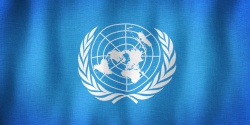Published: 28.11.2019

International attempts at undermining the protection of human life are becoming more frequent. One such attempt took place at the Nairobi Summit, attended by an Ordo Iuris delegation. The Institute’s lawyers were in the minority of organisations defending life and family values allowed to participate in the Summit.
Between 12 and 14 November, the capital of Kenya hosted delegations from more than 170 countries during a summit marking the 25th anniversary of the International Conference on Population and Development, which originally took place in Cairo in 1994. Similar to the Cairo conference, the main subject in Nairobi was what is referred to sexual and reproductive health. This time, the organisers did not mention the threat of overpopulation which dominated its predecessor, instead focusing on promoting “liberating” reproductive and sexual rights.
Summit authorities thus intended to avoid a repeat of the Cairo scenario, which saw a broad coalition of states brought together by the diplomatic efforts of the Vatican be able to stop the most radical of the pro-abortion postulates raised during the conference. Thanks to the strong objections of Pope John Paul II, the Programme of Action adopted in Cairo served as confirmation that everyone has the right to life, family is the primary social group and should be supported, and abortion should never be promoted as a method of family planning.
The Nairobi Summit was different, however, as its organisers opted to convene and prepare the event in a completely different way. Most importantly, they wanted to avoid the mistake made in Cairo, where the length of the discussions gave the conservative coalition the time it needed to significantly alter the final document of the Summit – the Programme of Action. Which is why this time, the document had been published as early as two months before the Summit took place, and the event itself was supposed to run for only three days, unlike the Cairo conference, which lasted nearly two weeks.
According to the Nairobi Statement, the primary goal of the Summit was to rapidly “accelerate” the implementation of a radical programme of reproductive and sexual rights. The main theme of the Summit was thus to “accelerate the promise”. The issues which received the most attention in the Statement and materials promoting the Summit, as well as in terms of discussions and presentations during the event, were access to “safe abortion” and “comprehensive sexual education”. What is more, the organisers, going against already established definitions, deliberately used the broad term “reproductive and sexual health and rights”, even though the Cairo conference explicitly rejected attempts at establishing a separate legal category for sexual rights. This is because the term serves to advance the LGBT agenda, which includes acknowledging “gender identity” and sexual orientation as categories protected by law.
Fully aware of the lack of unanimous support for this programme, the Summit authorities based its organisation on a single UN agenda – the United Nations Population Fund (UNFPA), as well as enlisting the help of the governments of Denmark and Kenya, the event’s host. The group of organisers being so narrow, combined with its unprecedented attempt at silencing the attendees by publishing a ready-made, non-negotiable statement, gave rise to serious accusations towards the conference.
The Vatican summed up the objections raised against the Nairobi Summit in its justification for its withdrawal from participating. According to the Permanent Observer of the Holy See to the United Nations, the Nairobi Statement was not preceded by consultations and thus cannot be presented as an expression of international consensus, in addition, “it is also regrettable that the conference will be held outside of the United Nations framework, thus precluding transparent intergovernmental negotiations while conveying the misleading impression of ‘consensus’ on the ‘Nairobi Statement’”. The Vatican diplomats thus concluded that the Nairobi Summit “cannot be deemed a meeting requested by the United Nations or held under its auspices”.
Despite the protests, representatives from more than 170 countries and hundreds of NGOs from across the globe attended the event. The organisers were fully aware that all objections regarding the Summit’s organisation would have to be forgotten if all attendees unanimously accepted the radical Nairobi Statement. To that end, numerous sessions were organised for the purpose of formulating commitments by governments and NGOs to undertake concrete actions and make detailed declarations.
However, these commitment sessions were used by some governments to distance themselves from the Nairobi Statement. The commitment statement issued by the U.S. included a pledge to provide financial support for international programmes supporting female empowerment, opportunities and development, without infringing upon the inherent dignity and value of every human life. During the summit, the U.S. Ambassador to Kenya warned against pro-abortion groups, openly stating that they are attempting to rewrite the Cairo Declaration adopted by 179 countries in 1994, and replace it with commitments which extend far beyond what was agreed upon during that conference.
Formalities were abused to ensure a unanimous decision, preventing many international organisations which protect traditional values, life and the family from attending the Summit. These included C-FAM experts, who work with the UN in New York, as well as Family Watch International and CitizenGO. Representatives of these organisations did come to Nairobi, however, and organised an alternative event with the support of local organisations and the Nairobi Archdiocese.
“The representatives of the Ordo Iuris Institute could only be granted delegate status by directly contacting the Kenyan government, which had been increasingly critical of the actions of the other organisers of the Summit. This way, we became active participants of the Nairobi Summit and speakers at the alternative summit convened by international organisations which were denied participation”, says Dr Tymoteusz Zych, Vice President of Ordo Iuris.
Before the Summit commenced, the Ordo Iuris Institute sent in its four proposed “commitments”: limiting abortion, limiting access to pornography, improving perinatal care, the educational primacy of parents, particularly in matters related to the psychosexual development of children. Every commitment was based on a particular act of international law, UN documents and resolutions adopted in the course of previous international conferences.
“It is noteworthy that, despite their previous declarations, the organisers failed to provide a time slot for us to publicly present our ‘commitments’”, adds Dr Tymoteusz Zych.
The theme of the alternative summit was “Friendship, life and the family”. The event was organised by the Catholic University of Eastern Africa in Nairobi, the Nairobi Archdiocese, C-FAM, Family Watch International, Caritas, CitizenGo, Ordo Iuris and a number of international and local organisations. In addition to pro-life organisations, the conference was attended by delegations from those American, European and African countries which stand in opposition to implementing an international “right to abortion”. An important event was the participation of the Apostolic Nuncio to Kenya, Archbishop Hubertus van Megen, who rejected the resolutions of the Nairobi Summit, noting that its goals are completely alien to an average African. He also once again reiterated that the Holy See is completely against the imposed Nairobi Statement.
During the alternative summit, Dr Tymoteusz Zych and Anna Jackowska presented the results of research on the correlation between the quality of perinatal care and legal regulations prohibiting abortion. Based on official WHO data, they demonstrated a noticeable relation between the prohibition of abortion and a low perinatal mortality index. Based on statistical data, the Ordo Iuris lawyers proved that countries from various parts of the world which have implemented regulations protecting prenatal life also stand out for their higher quality of perinatal care and low rates of perinatal mortality in mothers compared to other countries in their respective regions. Also invited was Pastor Jan-Aage Torp, who talked about the negative impact of the enactment of pro-abortion laws on the quality of perinatal care in Norway.
Dr Tymoteusz Zych also presented the results of research conducted by Ordo Iuris on legal regulations protecting children from pornography.
“Our presentation was met with a great deal of interest. Particularly in Africa, international pressure can be felt to legalise abortion as a means of reducing the perinatal mortality of mothers. Our research demonstrates that this approach stands in opposition to WHO data and the experiences of many countries across the globe,” says Anna Jackowska, analyst at Ordo Iuris.
On the last day of the Nairobi Summit, governments of twenty countries officially objected to the Nairobi Statement imposed on them. Ordo Iuris representatives participated in a special conference convened for this purpose by representatives of countries such as Poland, the U.S., Brazil, Hungary, Belarus, Egypt and Senegal. The official protest statement was read by Valerie Huber from the U.S. Department of Health. The statement mentioned the significant political, social and demographic progress made by many countries over the course of the last 25 years, as well as referring to countries which are still developing and have yet to face many challenges, which the international community should help them overcome. She also noted that, in accordance with the 1994 Cairo conference document, everyone has the right to life, family is the primary social group and should be supported, and abortion should never be promoted as a method of family planning. The Cairo programme respected religious beliefs and individual values. Huber also made it clear that there is absolutely no consent to the promoting of abortion, and no international consensus exists according to which killing babies is a human right.
Declarations by 20 governments emphasised that the Nairobi Statement stands in violation of the internationally recognised concept of human rights, which does not encompass what is referred to as sexual and reproductive rights or “safe” abortion. Also rejected was the form in which the organisers of the Nairobi Summit attempted to force the attendees to accept the Nairobi Statement, which had been drafted even before the conference took place.
The event was also attended by Kenyan MPs, who noted that the Kenyan constitution protects all human life and prohibits abortion. They also emphasised that Kenya is a country which protects unborn babies and is pro-family, and that the family has a special place in Kenyan culture, meriting special protection. The MPs also stated that, to the Kenyan population at large, terms referring to reproductive health are alien concepts, and called introducing 10-year-olds to sex absurd. Their statements complemented the more diplomatic tone of the speech given by President Uhuru Kenyatta, who presented Kenya’s commitments and made it clear that Kenyan values include the “sanctity of life and the family”.
Ordo Iuris representatives participated in both the Nairobi Summit and the alternative event. Dozens of meetings were held with state and social organisation delegations, and they also expressed their opinions during the most controversial panel discussions of the Summit, including the conference on combating the rise of conservative organisations and Christian communities, during which the international activities of Ordo Iuris were mentioned twice. During an official panel discussion, Summit speakers presented graphics which compared religious beliefs to a pile of dirty underwear and condemned the “dangerous and backwards” Joint Declaration signed by Pope Francis and Patriarch Kirill, which listed modern threats to life and the family.
“A clear voice of protest of the broad coalition of social organisations and states, including the diplomatic involvement of the Polish government and the intense efforts of Ordo Iuris on-site, made it possible to prevent the Nairobi Statement from being passed unanimously. This lack of unanimous support, so important to the Summit’s organisers, was acknowledged during the speech closing the Nairobi Summit,” says Jerzy Kwaśniewski, Counsellor at Law and President of Ordo Iuris.
In their own way, the organisers admitted that “push-back voices” could be heard during the Summit. It was announced that, in the future, “push-back voices shall be pushed back”. The speech ended with a hardly-enthusiastic callback to the 1994 population conference – “ICPD is alive!”.

24.04.2024
Mysterious links, the Kremlin, Catholic fundamentalism – Polish pro-abortion activist Klementyna Suchanow continues her crusade against her country’s main pro-family, anti-abortion lawyers’ organization, the Ordo Iuris Institute.

· The European Parliament adopted a resolution calling for the inclusion of the so-called right to abortion in the Charter of Fundamental Rights of the European Union.

· The anti-life projects proposed by our ruling coalition are only the beginning of a political process leading to the normalisation of the mass killing of unborn children.
· The French law of 1974, which was only supposed to open the floodgates to prenatal killing for women in distress, in fact established a new legal foundation through which almost a quarter of a million children lose their lives in France every year.